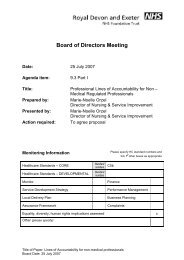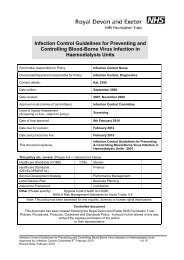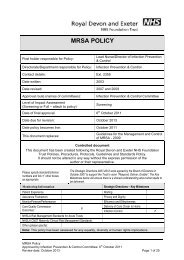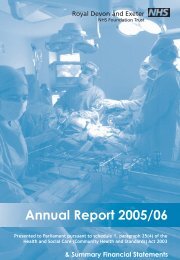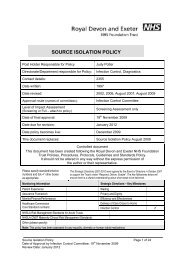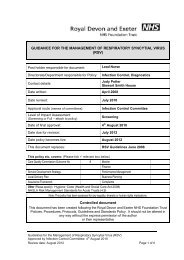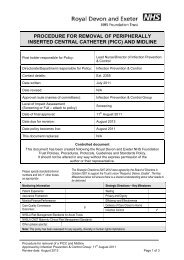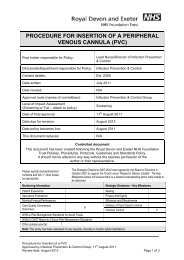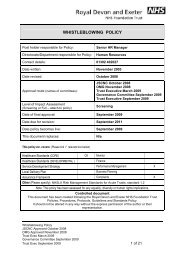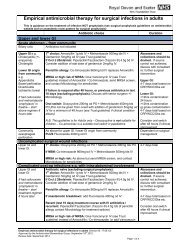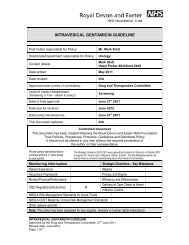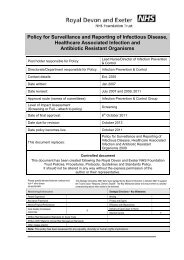Annual Report and Accounts 2012/13 - Royal Devon & Exeter Hospital
Annual Report and Accounts 2012/13 - Royal Devon & Exeter Hospital
Annual Report and Accounts 2012/13 - Royal Devon & Exeter Hospital
Create successful ePaper yourself
Turn your PDF publications into a flip-book with our unique Google optimized e-Paper software.
70 4. Our Governance<br />
<strong>Royal</strong> <strong>Devon</strong> <strong>and</strong> <strong>Exeter</strong> NHS Foundation Trust<br />
<strong>Annual</strong> <strong>Report</strong> <strong>and</strong> <strong>Accounts</strong> <strong>2012</strong>/<strong>13</strong><br />
Board Meetings<br />
The papers for the monthly Part 1<br />
Board meeting <strong>and</strong> the approved<br />
minutes of the previous meeting are<br />
published on the Trust’s website in<br />
advance of the Board meeting. In<br />
advance of the legislation compelling<br />
NHS Foundation Trusts to hold their<br />
Board meetings in public, the RD&E<br />
decided in June <strong>2012</strong> to move to open<br />
Board meetings that were accessible<br />
to the public. These are meetings<br />
that take place in the public arena<br />
rather than public meetings, although<br />
members of the public have the<br />
opportunity to ask questions at the end<br />
of the public section of the meetings.<br />
Items of a confidential nature are<br />
discussed by the Board in private<br />
in a monthly ‘Part 2’ meeting. The<br />
issues discussed in the closed sessions<br />
tend to be commercial in confidence<br />
issues that may impede the conduct<br />
of the Trust’s business if they were to<br />
be aired publicly. The 1960 Act on<br />
admissions to public meetings is used<br />
by the Board to help determine which<br />
topics are discussed privately <strong>and</strong>, over<br />
the course of the year, the Board has<br />
sought to discuss the majority of its<br />
business in open session.<br />
In addition to its ten formal Board<br />
meetings, the Board also holds a<br />
number of development <strong>and</strong> strategy<br />
sessions as well as briefing meetings<br />
<strong>and</strong> seminars. It also has increasingly<br />
used task <strong>and</strong> finish groups to tackle<br />
key issues.<br />
The framework within which decisions<br />
affecting the work of the Trust<br />
are made are set out in the Trust’s<br />
published St<strong>and</strong>ing Orders, St<strong>and</strong>ing<br />
Financial Instructions <strong>and</strong> Scheme of<br />
Delegation, copies of which may be<br />
viewed on the Trust’s website (www.<br />
rdehospital.nhs.uk) or on request from<br />
the Foundation Trust Secretary.<br />
The composition of the Board<br />
is in accordance with the Trust’s<br />
Constitution <strong>and</strong> the Policy for the<br />
Composition of NEDs on the Board.<br />
The Board considers it is appropriately<br />
composed in order to fulfil its<br />
statutory <strong>and</strong> constitutional function<br />
<strong>and</strong> remain within Monitor’s Terms<br />
of Authorisation. In consultation<br />
with Governors, it has, through its<br />
recruitment of NEDs, been able to<br />
maintain a good quality <strong>and</strong> effective<br />
Board that is appropriately balanced<br />
<strong>and</strong> complete.<br />
There is a clear division of responsibility<br />
between the Chairman <strong>and</strong> the Chief<br />
Executive. The Chairman heads the<br />
Board, providing leadership <strong>and</strong><br />
ensuring its effectiveness in all aspects<br />
of its role, <strong>and</strong> sets the Board agenda.<br />
The Chairman ensures the Board<br />
receives appropriate information<br />
to ensure that Board Members can<br />
exercise their responsibilities <strong>and</strong> make<br />
well-grounded decisions. The Chief<br />
Executive is responsible for running<br />
all operational aspects of the Trust’s<br />
business, assisted by the team of<br />
Executive Directors.<br />
The Chairman <strong>and</strong> all Non-Executive<br />
Directors meet the independence<br />
criteria laid down in Monitor’s Code<br />
of Governance (Provision A.3.1).<br />
The Board is satisfied that no direct<br />
conflicts of interest exist for any<br />
member of the Board. There is a full<br />
disclosure of all Directors' interests<br />
in the Register of Directors’ Interests,<br />
which is available upon request from<br />
the Foundation Trust (FT) Secretary.<br />
Directors <strong>and</strong> Governors may appoint<br />
advisors to provide additional expertise<br />
on particular subjects if required.<br />
The Board of Directors is accountable<br />
to the membership via the Council of<br />
Governors. The Chairman informs the<br />
Council of Governors about the work<br />
<strong>and</strong> effectiveness of the Board at each<br />
Council Meeting.<br />
The business of the Trust is conducted<br />
in an open manner <strong>and</strong> annual<br />
schedules of meetings for the Board of<br />
Directors <strong>and</strong> Council of Governors are<br />
published twelve months in advance.



